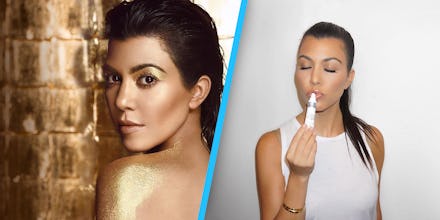The Kardashians' Manuka honey is all over Instagram. Is it better than the regular kind?

This past spring, Kourtney Kardashian revealed her beauty secret: Manuka honey. Or, at least, she was paid to claim this was the case.
The Kardashian partnered with the Manuka Doctor to create and brand a line of skincare and beauty products using this illusive magical honey. In May, Kourtney also endorsed Simply Gum, an all-natural chewing gum with proven health benefits. So hey, maybe she's onto something with all the healthful endorsements?
So what makes Manuka honey different than your average plastic squeeze bear honey?
Similar to regular honey, Manuka honey is naturally made by bees, but Manuka is specific to New Zealand, where bees pollenate the native Manuka bush. Honey has been used medicinally since ancient times, thanks to its antimicrobial properties, which help heal wounds. While all honeys have these healing properties, Manuka honey has a higher concentration of these compounds. But is Manuka actually healthier than other types of honey?
"Manuka honey is touted as being higher in antimicrobial compounds than other forms of honey and there is some promising research in this area," Samantha Cassetty, registered dietitian and vice president of Nutrition for Luvo said in an email. "There is pretty good evidence that honey has some healing benefits... It may help ease coughs at least as well as cough suppressant medicine and there is evidence that the antimicrobial effects can help with burns and wound healing when honey is applied to the skin."
Manuka honey is graded by the Unique Manuka Factor (UMF) Honey Association, which assigns Manuka a UMF label of 4-20, rating the honey on how much Leptosperin, DHA and Methylglyoxal i.e. healing compounds it has. A Manuka with a UMF grade of 20 is much more healthful than one of 4, but does not mean that a lower grade Manuka does not have health benefits — they all do!
An April 2011 study investigating the medicinal uses of honey also found that "the medihoney and manuka honey have been shown to have in vivo activity and are suitable for the treatment of ulcers, infected wounds and burns" and manuka has also "been demonstrated to be effective against several human pathogens, including Escherichia coli (E. coli), Salmonella typhimurium" and more.
Manuka may also have positive effects on your dental hygiene! An April 2004 study concluded that "there may be a potential therapeutic role for manuka honey confectionery in the treatment of gingivitis and periodontal disease." Yum.
Manuka honey is used in food products ranging from packaged beverages like Honeydrop's Apple Gingerade, throat lozenges, and is, of course, sold like regular honey from a variety of retailers. Use it as you would regular honey, but don't start chugging the Manuka, no matter how sweet it sounds. "Don't forget that honey is still an added sugar, something we could all use a little less of," Cassette said. Maybe stick to applying it mostly to your face, just like a Kardashian.